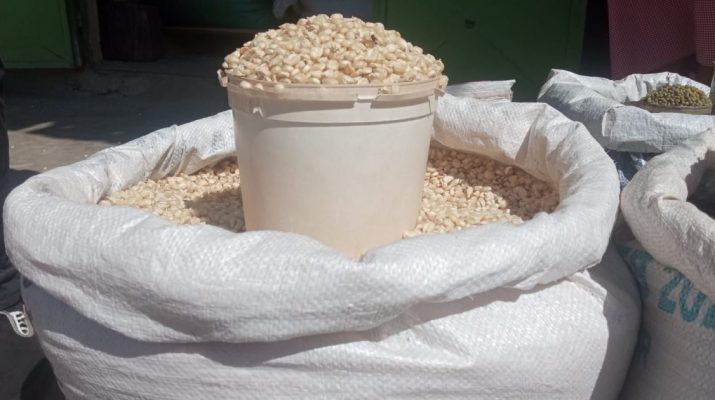By Debra Rono
Detectives from the Directorate of Criminal Investigations (DCI) and The Kenya Plant Health Inspectorate Service (Kephis) have confiscated 13,000 packets of counterfeit maize worth 13 million in Njoro, Nakuru County.
The detectives also confiscated 18 bags of maize, 34,708 fake Kenya Seed Company stickers, sewing machines, and packaging materials in the area.
According to county commissioner Lyford Kibaara, the maize was confiscated in a timber yard.
While speaking at the DCI offices in Nakuru on Wednesday Mr. Kibaara called on farmers to be careful not to be duped into buying seeds not certified by Kephis.
“All seeds should bear Kephis label and further have a seal indicating the date of production and as well as the lifespan,” added the County Commissioner.
The seeds seized were hybrid 6213 maize varieties and were packaged and ready to be distributed to farmers in the country.
The commissioner further explained that the national government administrative officers will work in collaboration with the national police service, Kephis, and licensed seed companies to ensure the right products reach the farmers all over the country.
“The government will not allow crooks and companies to mislead farmers by selling them counterfeit seeds. We’ll put in place stringent measures to save farmers,” said the official.
Mr Kibaara also revealed that the relevant authorities are on high alert to deal with criminals who plan to distribute fake fertilizers to Kenyans.
The head of seed certification and plant variety protection at Kephis Simon Maina promised Kenyans that seed inspections are ongoing to make sure farmers buy the right seeds. He also further advised farmers to be careful not to be conned by unscrupulous traders into buying fake farm input.
Mr Maina revealed that they had arrested a trader at the timber yard on Wednesday and that he had been taken to court for contravening the Seeds and Plant Varieties Act.
“KEPHIS will conduct nationwide surveillance to check whether any of the fake seed has been distributed. I also ask anyone with information on this case or any similar incident to report to any of our offices, the police, or the nearest County Department of Agriculture office. Any report will be treated with confidence and acted on immediately” stated the official
Mr Maina went ahead to advise Kenyans on how to check for Kephis labels on seeds to ensure that they are not counterfeit.
Seed packets lower than 5kgs have sticker labels that farmers can scratch and send the code to 1393.
“Sending the message is free and in case the seed is not genuine, call the number provided on the label (0707891000) for assistance by KEPHIS staff,” he said.
Mr Maina expressed concern about our country’s dishonest Agro vet Dealers who have been deceiving farmers and undermining the government’s efforts to achieve sufficient food production.
“We will work day and night to deal with unscrupulous agro vets that are stocking fake seeds. The safety of our food starts from the planting stage. Farmers invested heavily in their farms but what we have witnessed is not good since poor harvests and low crop production are designed by such people,” said the Head of Seed Certification and Plant Variety Protection.
Mr Maina highlighted that it is the responsibility of the Kenya Plant Health Inspectorate Service (Kephis) to license and inspect stocks from different agro vets to guarantee their certification.
He also added that even though the country can give high food production by farmers it is being derailed by uncertified seeds.
Kenya Plant Health Inspectorate Service (Kephis) Managing director Theophilus Mutui has revealed that the directorate has received numerous complaints of fake seed traders and has warned that agro vet dealers that deal counterfeit seeds risk a fine of up to Ksh 1 million or a jail term of two years in a new move by the government to deal with deceitful traders.
Mr. Mutai however assured Kenyans that they are working with state agencies and the police to flush out the dishonest traders selling substandard seeds to unsuspecting Kenyan farmers.

